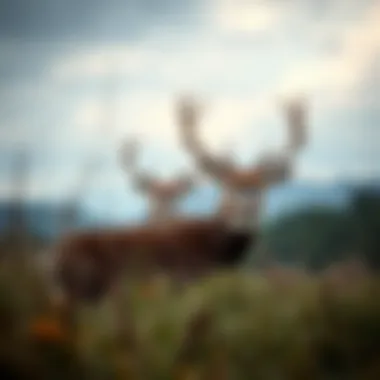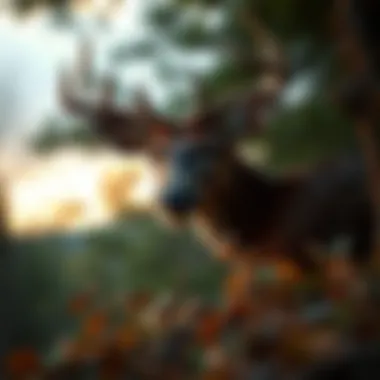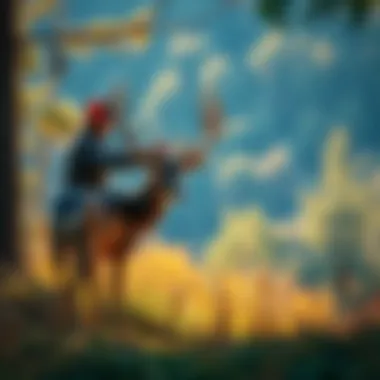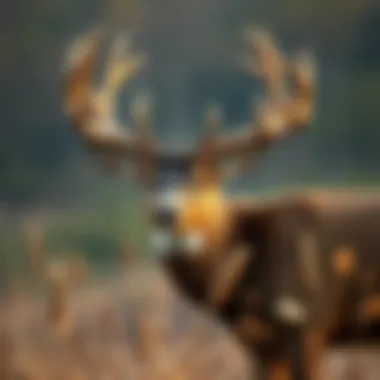Comprehensive Guide to Hunting Courses in North Carolina


Overview of the Topic
In the heart of the United States, North Carolina stands out not just for its charming landscapes, but also for its vibrant hunting traditions. Hunting is more than just a pastime; it’s deeply interwoven with the state’s cultural fabric. As more individuals express interest in exploring these outdoor activities, hunting courses have become essential conduits for knowledge and responsibility. These courses facilitate a better understanding of wildlife management, safety, and ethical practices, ensuring that both novice and seasoned hunters can enjoy the sport while preserving the environment.
Importance of Hunting Courses
Hunting courses in North Carolina serve multiple purposes. Primarily, they educate participants on the legal framework surrounding hunting, helping them navigate regulations like licensing and seasons. These courses also teach crucial skills ranging from firearm safety to tracking and identifying wildlife. In this context, it is vital to recognize that effective education can significantly influence the conduct of hunters in the field, promoting responsible practices that minimize risk to both hunters and wildlife alike.
Moreover, these courses underscore the pressing need for ecological awareness. Understanding ecological relationships and animal behavior contributes to more sustainable hunting practices, which in turn serve to maintain the balance of local ecosystems. With a growing emphasis on environmental stewardship, these courses advocate the idea that every hunter has a role to play in conservation efforts.
Current Status and Challenges
As of now, North Carolina boasts a robust system of hunting education programs, devised to tackle various challenges facing hunting in the state. Despite their availability, however, several complexities persist.
Challenges Facing Hunting Education
- Access to Courses: Not all potential hunters have equal access to training programs. Rural regions, in particular, may struggle with limited availability of courses, which makes engaging with responsible hunting standards difficult.
- Public Perception: Hunting often faces criticism and misunderstanding from non-hunters. Tackling misconceptions requires comprehensive educational initiatives not only directed at hunters but also aimed at the general populace.
- Safety Concerns: Incident reports involving hunting accidents highlight the ongoing need for improved safety training and awareness among hunters, particularly newer participants still learning the ropes.
- Sustaining Wildlife Populations: The delicate nature of wildlife populations necessitates that hunters remain informed on sustainable practices to ensure that their activities do not jeopardize future generations’ ability to engage in hunting.
Sustainable Practices and Solutions
To overcome these hurdles, North Carolina continues to innovate its hunting courses to ensure sustainability is interwoven in its curricula.
Effective Training Techniques
- Hands-On Experience: Many courses incorporate practical training, allowing participants to practice hunting techniques in real-world settings. This approach provides invaluable insight and builds confidence in new hunters.
- Mentorship Programs: Pairing inexperienced hunters with seasoned mentors facilitates knowledge transfer and ensures adherence to ethical practices. Mentorship programs help demystify hunting practices and galvanize a sense of community among hunters.
- Updated Educational Materials: As hunting regulations evolve, so do the educational materials. Continuous updates to courses about wildlife conservation, habitat preservation, and safety protocols remain crucial in adapting to new ecological studies and legal changes.
Impact and Importance
Ultimately, the benefits of proper hunting education extend beyond the individual. They ripple through communities and into ecosystems. When hunters are well-informed and respectful of their environment, communities stand to gain not just from the economic contributions of responsible hunting but also from the enhanced conservation efforts.
The importance of such courses is encapsulated in the following quote:
"Hunters become the stewards of the land, if they are equipped with the right knowledge and tools."
This underscores a rewarding cycle: educated individuals make for responsible hunters, able to contribute positively to their surroundings. Not only does this ethic safeguard local wildlife populations, but it also instills a legacy of conservation that future generations can inherit and cherish. Ensuring that hunting courses in North Carolina continue to adapt, innovate, and tackle contemporary challenges is of utmost importance. It’s not merely about hunting; it’s about harmonizing human activity with nature, fostering relationships that nurture the land and its creatures alike.
For those interested in further resources:
- North Carolina Wildlife Resources Commission
- N.C. State University Forestry & Environmental Resources
- Federal Emergency Management Agency
Engagement in responsible hunting practices, tied closely with education, ensures not just the joy of the hunt but a thriving landscape for years to come.
Understanding the North Carolina Hunting Course Landscape


Hunting courses in North Carolina serve as a crucial cornerstone for anyone looking to engage in responsible hunting practices. They provide not only the skills needed for effective hunting but also a foundation for understanding the ecological and ethical implications tied to the activity. As hunting in the state has evolved over time, these courses have adapted to meet the changing needs of both the hunters and the wildlife they pursue.
The importance of grasping the complexities of hunting courses lies in their multifaceted benefits. Not only do they impart practical skills related to firearm safety and wildlife management, but they also equip aspiring hunters with the ethical framework necessary to responsibly participate in the sport. Furthermore, with a strong emphasis on conservation, these courses often promote a sense of stewardship towards North Carolina's natural resources—this can lead to a more sustainable hunting culture.
Definition and Purpose of Hunting Courses
Hunting courses in North Carolina are structured educational programs designed to teach the fundamentals of hunting, including techniques, safety rules, and an understanding of wildlife conservation. Their primary purpose is to instill responsible behaviors in hunters, ensuring that generations to come engage in these practices with respect for both the law and the environment.
Such courses often cover a range of topics, from firearm safety to tracking animals. Moreover, they are usually required or highly recommended for individuals seeking to obtain a hunting license. By completing a course, hunters demonstrate that they possess the required knowledge and skills—a vital aspect of reducing accidents and promoting ethical hunting.
Historical Context of Hunting Education in North Carolina
The history of hunting education in North Carolina stretches back several decades. Historically, hunting was a primary means of obtaining food for many families. Consequently, practical skills and knowledge were often passed down through generations rather than learned through formal education. However, as populations grew and hunting pressure increased, the need for structured education became more apparent.
In response, state agencies began offering hunter safety courses in the late 20th century. These initiatives not only aimed to reduce hunting accidents but also educated participants on the importance of conservation. The evolution of these educational programs reflects broader societal changes in attitudes towards wildlife and habitat preservation.
Legal Requirements for Hunter Education in North Carolina
Legally, North Carolina mandates that anyone born on or after January 1, 1972, complete a hunter education course before obtaining a hunting license. This requirement underscores the state's commitment to ensuring that all individuals participating in hunting are equipped with essential knowledge and skills.
The courses are comprehensive, covering several key areas:
- Firearm safety
- Ethical hunting practices
- Wildlife laws and regulations
Such legal stipulations not only enhance safety but also align with conservation goals, as educated hunters are likely more considerate of environmental impacts. Additionally, many private landowners and hunting clubs often require proof of hunter education for their members, reinforcing the importance of formal training in the hunting culture.
Curriculum Overview of Hunting Courses
The curriculum of hunting courses in North Carolina is quite crucial as it lays the groundwork for responsible and effective hunting practices. This framework not only enhances participants' knowledge but also promotes ethical practices and safety, all while fostering a greater understanding of wildlife conservation. Diving deep into the curriculum, one can appreciate the diverse topics covered, and how they interconnect to form a holistic approach to hunting education.
Core Topics Covered in the Courses
Each course encompasses several essential topics that are vital for both new and seasoned hunters.
Wildlife Conservation Principles
The wildlife conservation principles section illustrates the importance of maintaining ecological balance and safeguarding biodiversity. By understanding how hunting fits into the greater picture of ecosystem management, participants gain awareness that hunting is not just about the act itself, but about sustaining nature for future generations. This aspect is a prominent feature of the curriculum, emphasizing that responsible hunting can be a tool for conservation, rather than a threat.
One of the key characteristics of the wildlife conservation principles is the focus on the scientific understanding of ecosystems and species management. Hunter education courses highlight how hunters can integrate their activities with conservation goals, making it a beneficial choice in many respects. The unique feature lies in the emphasis on promoting sustainable practices that ensure animal populations remain healthy and thriving, thus providing hunters with a clear path toward responsible participation in the ecosystem’s health.
Hunting Ethics and Safety Protocols
This topic delves into the moral responsibilities that accompany the sport, steering hunters toward a mindset that respects both the game and the environment. Emphasizing hunting ethics, this portion of the curriculum prepares individuals for the reality of being a hunter, which entails knowing when to take a shot and when to refrain. Safety protocols further build on this foundation by enforcing practices that prevent accidents, ensuring the safety of all involved.
The key characteristic of hunting ethics and safety protocols is their dual focus. Not only do they foster a responsible attitude toward hunting but they also promote practices that lead to a safer hunting experience. This dual emphasis certainly makes it a popular choice for the curriculum. Furthermore, the unique feature is the ongoing discussions about situational ethics—how to react responsibly in various scenarios while in the field, which gives hunters the moral framework necessary for making difficult choices.
Firearm Handling and Maintenance


The section on firearm handling and maintenance is indispensable in the hunting curriculum. This ensures that participants understand not only how to use their firearms responsibly but also how to care for them properly. A well-maintained firearm is crucial for safety and efficiency in the field.
A noteworthy characteristic of this portion of the course is the hands-on training offered. Participants get an opportunity to practice firearm handling under supervision, which is essential for building confidence and skill. The unique feature of including maintenance also educates hunters that keeping firearms in excellent condition can significantly enhance their performance. However, this can be viewed as a disadvantage if participants find the maintenance aspect challenging or tedious. Learning to repair and care for weapons takes time, but it can significantly impact their hunting experience.
Hands-On Training and Practical Applications
In addition to theoretical knowledge, hands-on training plays a critical role in hunting courses. Participants are given the opportunity to engage with the equipment, practice shooting, and participate in simulated hunting scenarios. This practical application reinforces the lessons learned in the classroom and offers invaluable experience in a controlled environment.
Real-world practice is what distinguishes successful hunters from novice ones. A solid grasp of techniques ensures that hunters are comfortable and precis in their approach when out in the field.
Assessments and Certifications
Completion of the curriculum usually culminates in assessments and certifications. These evaluations gauge understanding and practical competence, ensuring that participants are prepared for responsible hunting. Upon successful completion, participants receive certifications that validate their skills and knowledge, which is often a legal requirement for hunting in North Carolina. This endorsement not only provides confidence to hunters but also helps them navigate regulations and hunting opportunities throughout the state.
Diverse Formats of Hunting Courses
The way we learn is as varied as the people who participate in hunting courses. With a shift in the education landscape, hunting courses in North Carolina come in several formats, enriching the overall experience while catering to diverse learners. This variety not only broadens access to training but also accounts for different learning styles, frequency of participation, and locations. Exploring these formats introduces prospective hunters to opportunities that align with their preferences and schedules.
Online vs. In-Person Training
In recent years, online learning has taken the education sector by storm. It offers flexibility and convenience, enabling the busy hunter to work through a curriculum at their own pace. Learners can fit the training around work, family commitments, or even hunting seasons. Additionally, online courses often allow for interactive elements such as quizzes, videos, and peer discussions, facilitating a more engaging learning experience.
However, in-person training has its place too. There's something visceral about hands-on experiences that online settings can’t replicate. Participating in an in-person course allows aspiring hunters to interact directly with their instructors, ask instant questions, and even engage in real-life simulations of hunting scenarios.
Ecological and Ethical Considerations
Understanding the impact of hunting goes beyond mere activity; it encompasses a holistic examination of ecosystems, ethical practices, and the responsibilities associated with this age-old tradition. Through this section, we delve into various facets of hunting that resonate deeply with conservationists, environmentalists, and students alike, emphasizing the need for a balance between time-honored practices and modern ecological sensibility.
Impact of Hunting on Ecosystems
Hunting isn't just about wielding a weapon; it's an interaction with the environment that can sway the very fabric of ecosystems. When hunters go afield, they inadvertently become part of a larger ecological equation. The removal of certain species, for instance, can have ripple effects throughout food chains and habitat structures. Overhunting might lead to population imbalances while targeted hunting can support species management. For example, in some areas of North Carolina, managing deer populations through regulated hunting has been shown to improve habitat quality for various other wildlife species.
- Natural Selection: Hunting can inadvertently act as a form of natural selection, influencing the traits passed on through generations.
- Population Control: Regulating species populations helps prevent issues like overgrazing or the spread of disease.
- Biodiversity Preservation: Thoughtful hunting practices can contribute to the conservation of diverse species by funding exams or offsetting the cost of habitat restoration.
Moreover, it’s worth noting that hunting can sometimes lead to habitat conservation. Some game areas are prioritized for their biodiversity, hence, providing a protective fence around various species. As a result, the pursuit of game can align with sustaining ecosystems, fostering a healthier environment overall.
Sustainable Hunting Practices
Sustainability is a buzzword crossing various sectors, and hunting is no exception. Adopting sustainable practices is essential for ensuring that hunting remains a viable sport and conservation tool for future generations. Sustainable hunting isn't just a theoretical concept; it encompasses specific actions and policies that hunters can take to minimize their impact on the environment. This approach encompasses a range of practices, such as:
- Use of Non-Toxic Ammunition: Switching to lead-free ammunition helps reduce environmental pollution.
- Conservation Funding: Many hunters participate in programs that directly offer funds for wildlife conservation and habitat maintenance.
- Local Sourcing: Choosing local hunting grounds ensures that species remain part of their natural habitat and minimizes transportation impacts.
Hunters who engage in these practices not only contribute to sustainable ecosystems but also affirm their role as stewards of the land. Each ethical hunter's choice has the power to advocate for lasting protection of North Carolina’s natural resources.
The Role of Hunters in Conservation Efforts


Hunters are often at the forefront of wildlife conservation, whether they recognize it or not. While some detractors may view hunting as purely a recreational pastime, it is vital to spotlight the significant financial and social contributions that come through these enthusiasts. According to the Association of Fish and Wildlife Agencies, hunters contribute over $1 billion annually towards conservation efforts in the U.S. alone. This funding underpins countless initiatives aimed at protecting wildlife habitats and restoring endangered species.
Their role in conservation can be seen in various initiatives:
- Habitat Restoration Programs: Many hunters actively participate in projects that restore wetlands, forests, and other natural landscapes that benefit all wildlife.
- Data Collection: Hunters report data that help biologists track wildlife populations and develop effective management strategies.
- Advocacy: By supporting conservation laws and initiatives, hunters can help shape policies that promote environmental stewardship.
"Hunters are often the first to advocate for protecting natural habitats; their love for wildlife drives their commitment to preservation."
This perspective reinforces the idea that hunting can coexist elegantly with conservation. By understanding their roles, hunters are empowered as stewards and champions for ecosystems, ensuring the cycle of wildlife and nature can thrive for generations to come.
In summary, the intersection of hunting with ecological and ethical considerations is profound. It's not merely about the thrill of the chase, but an ongoing commitment to habitat protection and species management that underscores the dual responsibilities of enjoyment and conservation. Each hunter’s choice reflects a broader implication, paving the path forward for responsible hunting that respects the delicate balance of nature.
Societal Perspectives on Hunting
Understanding the societal perspectives on hunting is crucial for grasping its role in North Carolina's culture and environment. This section elucidates how hunting is not merely a recreational activity for some but a deep-seated tradition that intertwines with community identity, conservation efforts, and ethical debates. The multifaceted nature of hunting provides numerous benefits and presents pressing considerations for both active participants and the general public.
Hunting as a Cultural Tradition
Hunting has long been woven into the fabric of North Carolina's heritage. For many families, it serves as an annual rite of passage, marking seasonal shifts and cultivating relationships among relatives and friends. This tradition often transcends generations, with stories of past hunts shared around the dinner table, fostering a sense of belonging and continuity.
Additionally, local communities host various hunting events, reinforcing social bonds. The camaraderie that develops during these excursions helps cultivate a shared identity among hunters. Many claim that participating in hunting deepens their appreciation for nature and enhances their knowledge of local ecosystems, emphasizing stewardship and respect for wildlife. This cultural significance cannot be understated, as it plays a pivotal role in preserving traditions and fostering environmental awareness in younger generations.
Public Opinions and Controversies
Public opinion on hunting is a complex tapestry, with advocates highlighting conservation benefits and opponents focusing on ethical dilemmas. Proponents often argue that hunting is essential for wildlife management. They point to the role of hunters in controlling animal populations, which helps maintain balance in ecosystems. This perspective aligns with conservationists who appreciate regulated hunting as a tool for preserving biodiversity.
Nevertheless, the controversies surrounding hunting cannot be ignored. Many individuals and groups contend that killing animals for sport is unethical, raising questions about animal rights and welfare. As animal advocacy movements expand, public sentiment has also shifted, leading to heated discussions and sometimes legal battles over hunting regulations. In this context, it becomes imperative for hunters to articulate their practices and values clearly to bridge these divides and foster understanding.
"To be part of a community, one must listen to its fears and aspirations. Hunting can be as much about conversation as it is about conservation."
Integration of Hunting in Modern Society
In today's fast-paced world, the integration of hunting into modern society is evolving. With increasing urbanization and technological advancement, many young people find themselves distanced from traditional hunting practices. Online courses and digital platforms now serve to educate new hunters, making learning more accessible and often more engaging. These innovations are crucial for attracting a new generation to the sport, keeping tradition alive even amid modern conveniences.
Additionally, hunting is sometimes framed within the discourse of sustainability. Many hunters advocate for ethical hunting practices that emphasize conservation and responsible behavior. This approach aligns with broader social movements focused on environmental stewardship and responsible resource use. As such, hunting can be positioned as a positive force for conservation when practiced responsibly.
Epilogue and Future Directions
As we draw the curtains on our exploration of hunting courses in North Carolina, it's essential to consider more than just the immediate educational benefits. The future of hunting education holds the potential to influence not only the participants but also the wildlife ecosystems and the cultural narratives that frame hunting as an integral part of life in the state. The right education is paramount. With carefully structured courses, participants are taught not just how to hunt, but also how to hunt responsibly and ethically, which is critical in a rapidly changing environmental landscape.
Summary of Key Insights
The key insights from our survey of North Carolina's hunting courses emphasize several indispensable aspects:
- Legal Framework: Understanding the regulations governing hunting is crucial for both novice and seasoned hunters. It helps ensure safety and compliance, protecting not only the individual but also the wildlife.
- Curriculum Depth: The range of topics covered in these courses—from firearm handling to ethical hunting practices—shapes a well-rounded hunter. Practical applications reinforce theoretical knowledge, boosting confidence and competence in the field.
- Societal Influence: Courses influence how hunting is perceived in society. Proper education cultivates respect for wildlife and promotes conservation efforts, aligning the hunter's practices with broader environmental goals.
- Diverse Formats: The mix of in-person, online, and community-based formats enhances accessibility, making it easier for a broader audience to engage in hunting education.
Thus, the role of hunting courses is multifaceted, extending beyond skill acquisition to shaping responsible and environmentally conscious stewards of nature.
Anticipated Trends in Hunting Education
Looking ahead, several trends in hunting education are emerging:
- Increased Technological Integration: With advancements in technology, we can expect more online platforms offering immersive learning experiences, such as virtual reality simulations of hunting scenarios. This could greatly enhance the practical understanding of hunting techniques.
- Focus on Mental Health and Community Building: Hunting is often seen as a solitary activity, but courses are beginning to emphasize community, bonding, and shared experiences. This new focus may foster stronger social connections and promote well-being among participants.
- Environmental Stewardship Initiatives: More programs are likely to integrate lessons on the ecological impact of hunting and conservation. Educating hunters on their role in wildlife management can align hunting with broader conservation goals.
- Diversity in Participation: As attitudes toward hunting evolve, we'll see increases in participation from diverse demographics, with specific programs aimed at underrepresented communities. This diversity can enrich the hunting culture and enhance dialogue around ethical practices.



